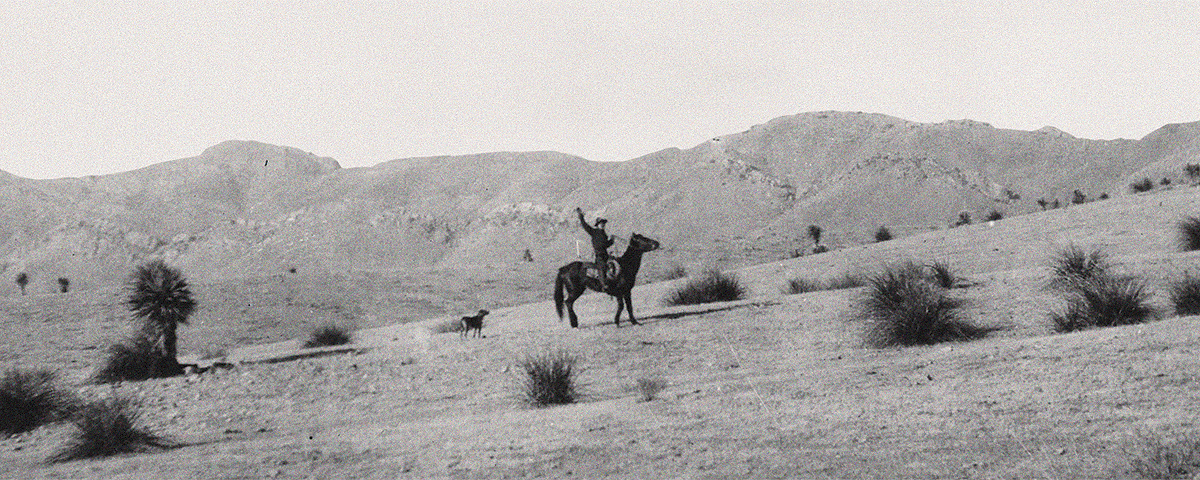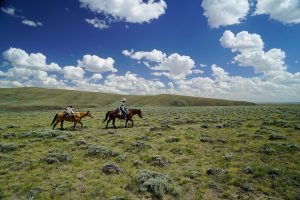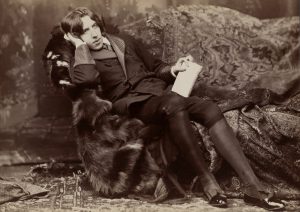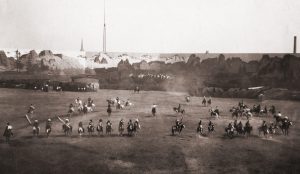A foray into colonial Cuba in late 1904 nearly cost Badger Clark, an early day cowboy poet, an indeterminate amount of time on that island—but Yankee ingenuity prevailed. After his release from a Cuban jail, but before receiving official permission to leave the island, he absconded on an American steamship and hightailed it back to the United States. From his in-depth exposure to Spanish he brought home a certain familiarity with the language, a skill he’d later find useful.
Charles Badger Clark Jr., a future poet laureate of South Dakota, took his first breath on New Year’s Day 1883 in Albia, Iowa. Friends called him Charlie, though he later went by the old family name Badger to alleviate confusion with his father. Charles Badger Clark Sr. was a Union veteran of the Civil War and a Methodist minister. When Badger was still an infant, his family moved to eastern Dakota Territory, where the Rev. Clark established churches and helped found Dakota Wesleyan University in Mitchell.
Six months after the family moved to Deadwood in 1898 to serve another church, Badger’s mother, Mary, died of tuberculosis; his older brother, Frederick, had succumbed to the disease four years earlier at age 21. Badger and his father “bached it” until 1901, when the Rev. Clark married schoolteacher Anna Morris, who became Badger’s muse.
As a teen Clark attended Dakota Wesleyan for a year but just didn’t take to college. He wanted adventure—and he got more than he bargained for, along with an education he could not have gotten studying books, in Cuba. In December 1903 D.E. Kerr, a real estate investor and promoter operating out of Chicago and Mitchell, S.D., organized a Cuba-bound colonization effort. The linchpin was a land deal of 9,000 acres in Camagüey Province with plans to develop a ranch. For home sites Kerr had obtained an additional 100 acres in Nuevitas, 45 miles east on a direct railway line.
During occasional visits from old ranch hands Clark would treat them to a meal as he listened intently and watched how they handled themselves. Such cowpokes in turn inspired Badger’s poetry, prose and songs
As often happens in such schemes, promoter Kerr had misrepresented certain facts about the living conditions, and within months the proposed colony fell apart, most of the group returning stateside. Clark stayed on and in July 1904 took a job working for Cuban-American farmer Augustin Rodriguez, who raised registered Berkshire hogs. Feral hogs roamed the property of his closest neighbors, Emilio Barretto and son Enrique, which strained relations, as Rodriguez didn’t want his pedigreed hogs mixing with the razorbacks. “[Rodriguez] and [Emilio] Barretto spent most of their time walking around each other with the hair of their backs standing up and their teeth showing,” Clark later quipped.
Tensions reached the boiling point when el patrón had Badger cut a fence so the pair could trespass on Barretto land to steal coconuts. When confronted by Enrique Barretto, Rodriguez shot and wounded the younger man. Clark and Rodriguez raced the Barrettos to the Camagüey police station but lost. Thus the authorities charged Rodriguez and held Clark on suspicion. “As we were the only Americans in the place,” Badger recalled of their time in jail, “the other prisoners were inclined to be sociable out of curiosity. The policemen were also sociable, as were the fleas, which far outnumbered both policemen and prisoners.”
As Rodriguez was half-American, he contacted the U.S. State Department, expecting embassy representatives would quickly secure his freedom. He was mistaken. Once formally charged, he wired his brother in New York to post the required $300 bail, but the cable didn’t go through. When he asked his American mother to raise the funds, she solicited all over town but couldn’t find a benefactor. Clark then asked a compatriot in Nuevitas to post their bail, but the willing friend hadn’t any money to loan.
Clark shared a cell with 17 men. “The massive walls on every side,” he wrote, “the brutal guards full of the insolence of authority, the lousy convicts with their ribald songs and unprintable conversation gave me a gone feeling at the pit of my stomach, and for the first time since the trouble I could not laugh.”
His first night in jail Clark slept on a brick floor with only his coat as a pillow. The next day he learned that his cellmates lived under a hierarchy led by an elderly con they called “el Presidente,” and that he could rent a cot. As food was poor and scarce, coffee was the daily highlight. The prison was stifling. Clark procured old magazines written in English, which he read and reread to keep his sanity.
A week into Clark’s stint the jailer put another American in his cell—a young, illiterate, penniless cowpuncher from Texas. An especially harsh judge had sentenced the Texan to a year in prison for drunkenness. He and Clark passed the time together. Badger also tutored a young Cuban prisoner eager to learn English.
Authorities released Clark after two weeks but required he remain in Cuba for six months on bail until his case was resolved. Ultimately acquitted in January 1905, he boarded an American steamship without seeking the blessing of the Yanqui-unfriendly Cuban judicial system. Once back in the United States, he made a beeline for the parental home in Deadwood, where the Rev. Clark continued to pastor the Methodist church.

Badger Clark spent the summer of 1905 with a surveying party in the South Dakota Badlands, where he made little money but restored his soul in the wide-open spaces. On his return to Deadwood in the fall he delved into the publishing profession, landing a job as a reporter with the Lead Daily Call in Lead (pronounced “leed”), S.D. Though not particularly challenged by writing about small-town happenings, he enjoyed it. Life was good, even better when he got engaged to Helen Fowler, a classmate from Deadwood High. “I must establish myself in a respectable line,” he recalled, “make a respectable amount of money, marry a respectable bride and, in due time, die with a respectable circle of grandchildren around my bed.”
Clark was respectable, but his life took a different turn. After a prolonged cough and a visit to the doctor he got the dreaded diagnosis: Tuberculosis. He’d caught it in its early stages, though, and the doctor advised a move to the Southwest, as an arid climate was the sole available “treatment” in that era. He left everything—and everyone—behind in the fall of 1905.
Badger meandered, looking for a place to settle. He first tried Albuquerque, New Mexico Territory, then Bisbee and Tombstone in Arizona Territory. But none offered the peace he required. While mulling where to head from Tombstone, he met cowhand E.K. “Spike” Springer, who thought there might be room for Badger on his cousins’ ranch just east of town.
There was, and the circumstances fit Clark as if all had been planned. The Spanish he’d learned in Cuba came in handy living so close to the border. Ranch owners Harry and Verne Kendall put him in charge of a small cattle herd with a short length of fence line to ride and maintain. Though he earned a meager salary, Badger had use of a remote adobe hut, where he lived with dogs, cats and a passel of chickens. Furthermore, his work was hardly strenuous and it occupied only about a day per month. The rest of the time he soaked up the atmosphere and wrote, playing an old guitar and honing his singing voice for entertainment. During occasional visits from old ranch hands Clark would treat them to a meal as he listened intently and watched how they handled themselves. Such cowpokes in turn inspired Badger’s poetry, prose and songs. In the interim he “forgot” about his TB, which subsided.
Eager to convey his new surroundings to fiancée Helen Fowler and stepmother Anna Clark, he included poems with his letters to them. Anna appreciated Badger’s growing talent as a wordsmith and on his behalf submitted a poem he’d titled “In Arizony” to Pacific Monthly. When Badger received a $10 check from the magazine, he decided he’d discovered a viable path to respectability—he’d make his living as a writer. He wrote in the vernacular and spelled phonetically for emphasis. His descriptive phrases painted word pictures cowmen could appreciate and city folks could visualize. “Ridin’” was the poem that launched Badger’s career as a poet:
There is some that like the city—
Grass that’s curried smooth and green,
Theaytres and stranglin’ collars,
Wagons run by gasoline—
But for me it’s hawse and saddle
Every day without a change,
And a desert sun a-blazin’
On a hundred miles of range.
Just a-riding’, a-ridin’—
Desert ripplin’ in the sun,
Mountains blue along the skyline—
I don’t envy anyone
When I’m ridin’.
Clark remained on the Arizona ranch for four years, during which time his father became chaplain at the Battle Mountain Sanitarium in Hot Springs, S.D. In 1910 the Kendall brothers fell on hard times and could no longer afford to keep him on the payroll, so Badger returned to his parents’ home on Eighth Street in Hot Springs. As the senior Clark grew increasingly feeble, Anna turned to junior for help. “[I] set about paying back some of the tender care he had given me when I was a sickly boy,” the younger Clark later recalled. “That repayment lasted 10 years and was one of the most satisfying tasks of my life.” The Rev. Clark died on June 10, 1921.

Badger remained at home with Anna another four years, until she chose to move into the South Dakota State Veterans Home, a privilege afforded her as the widow of a Civil War soldier. With permission from the state Clark then moved into a small cabin in Custer State Park. On Anna’s death in 1937, Badger gained a small inheritance, and with assistance he completed work on his own cabin, which he dubbed the Badger Hole. As it had no electricity, he used a woodstove and an icebox set into a recess in the floor. The resourceful Badger toted water from nearby Galena Creek, chopped his own firewood and relied on an outhouse.
Though the mustachioed Badger was tall, slender and handsome, and female readers sent him mounds of fan letters, he remained a lifelong bachelor. As he explained it, he enjoyed the solitude and was glad he never married. He’d twice been engaged to Helen Fowler, but he thought cabin life might be too primitive for his intended.
Anna, who continually encouraged Badger with his writing, once asked him to compose a cowboy prayer. “I had never really heard a cowboy pray,” Badger recalled. “I had heard some of them use some language that had a religious flavor, but generally not in a prayerful spirit. She kept after me however, and so I turned out my most famous work.” Though often attributed to “Anonymous,” it was Badger who wrote “A Cowboy’s Prayer (Written for Mother),” the most widely known poem/prayer in Western circles. It begins like so:
Oh Lord, I’ve never lived where churches grow.
I love creation better as it stood
That day You finished it so long ago
And looked upon Your work and called it good.
I know that others find You in the light
That’s sifted down through tinted window panes,
And yet I seem to feel You near tonight
In this dim, quiet starlight on the plains.
Many of Clark’s poems have been set to music. Such well-known contemporary artists as Bob Dylan, Judy Collins, Emmylou Harris and Michael Martin Murphey have recorded Badger’s work, notably “Spanish Is the Loving Tongue,” based on the cowboy poet’s 1907 work “A Border Affair.”
In 1937 South Dakota Governor Leslie Jensen, a longtime friend of Clark’s, named Badger the state’s first poet laureate (or “poet lariat,” as he called himself). The artist was known for both his historical and hysterical tales. His collection of short fiction, Spike, takes readers through several escapades with Badger and friends. Whether based in fact or not, his stories are descriptive and engaging. His historical nonfiction When Hot Springs Was a Pup relates that community’s early years. True to form, humor is a strong point in the book. Badger was also published in Sunset, Scribner’s, Ladies’ Home Journal and other respected (and respectable) national publications.
South Dakota’s favorite poet became a much sought-after speaker for events ranging from rural junior high and high school graduations to women’s club meetings and the 1913 celebration of Decoration Day (as Memorial Day was known) at Battle Mountain Sanitarium—the very place his father once preached, which remains part of the present-day Veterans Administration hospital complex. While traveling the Redpath Chautauqua adult education circuit in the early 1920s, Clark admitted, “I soon discovered that having a group of people at one’s mercy was rather fun, and I have done a good deal of talking and reading my own verse since, at one time traveling from Vermont to Los Angeles and from Oregon to Florida on my own jaw, so to speak.”
Clark never owned a car. To get around he hitched rides, rode the bus and walked. Once on a lark, on Nov. 16, 1917, he hoofed it to Rapid City, some 60 miles north, in 17 hours. He never did have running water or electricity installed in the Badger Hole. But he was able to scratch by on his earnings from writing and speaking. “I can live on $500 a year comfortably today—even on $400,” he once told a reporter. “I can’t stand to be in debt and won’t be. If I want something and can’t pay for it, I do without it until I can. The only thing I have against poverty is that I can’t afford all the wonderful books I’d like to have.”

Yet the lack of remuneration did concern Clark at times. In a candid June 13, 1934, letter to Methodist pastor and friend Ralph Shearer, Badger wrote: “Don’t people realize that writing and speaking is work? And that a few handshakes and ‘I-enjoyed-it-very-muches’ set pretty light on one’s stomach and don’t satisfy the grocer at all?”
The Badger Hole remains virtually as Clark left it when he died of throat and lung cancer on Sept. 27, 1957. The cabin within Custer State Park is open to visitors during the summer months. His personal effects—including clothing, flags and multiple pairs of boots—are still lined up in his bedroom. One addition to the cabin—electricity—allows for lights instead of kerosene lanterns. Badger Clark himself is buried in respectable Evergreen Cemetery in Hot Springs. WW
Peggy Sanders writes from her family farm in Oral, S.D., 45 miles south of the Badger Hole. For further reading she notes that the South Dakota Historical Society Foundation in Pierre recently republished all of Clark’s books, including a boxed set of hardbound editions.





